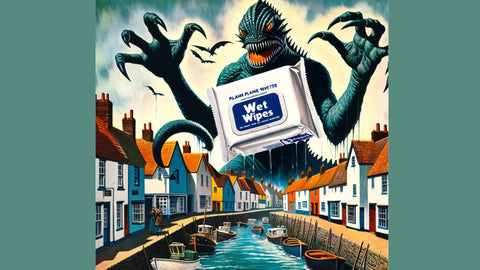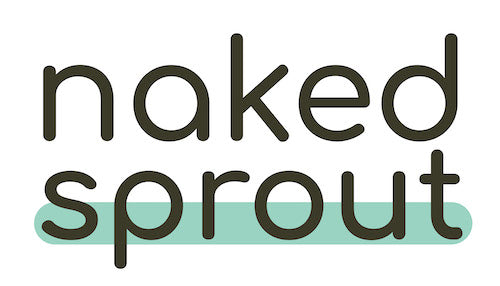Flushzilla: Why You Shouldn't Flush "Flushable" Wipes

You've seen them, probably even used them - wet wipes that promise a fresh, clean feeling with the added convenience of being flushable. Sounds ideal, doesn’t it?
Sadly, the reality doesn’t live up to the hype. Regardless of the promises on the packaging, these “flushable” wipes are causing some serious issues here in the UK. In this post we're lifting the lid on the not-so-pleasant story of what these wipes get up to after you flush.
The Misleading Misnomer: "Flushable"
First things first, let's talk about the term "flushable." You'd think it means that you can safely flush any tissue-like product down the toilet without any repercussions. But as those of us who use sanitary products will testify, this isn’t the case.
Most wipes, even those labelled as flushable, don't break down in water as quickly as toilet paper. Toilet paper typically disintegrates within seconds to a few minutes, while wet wipes can take weeks or even longer. This is because wet wipes are made of stronger fibres to keep them from falling apart when wet, which is great for cleaning, not so great for flushing.

So what can you flush down the toilet? Two members of the Naked Sprout team were lucky enough to take a sewer tour of Brighton a few years ago, and the engineer who led us on the tour was very clear on the three p’s; you can flush pee, poo, and (toilet) paper.
That’s it. No tampons, no facial tissues, and no wet wipes.
So what happens when you flush a “flushable” wipe?
1. Fatbergs
It’s an unpleasant name for an unpleasant phenomenon. Fatbergs are monstrous blockages made up of congealed fat, wet wipes, and other non-biodegradable items that have no business being in the sewers. In 2017, workers in London discovered a fatberg weighing approximately 130 tonnes (the weight of 11 double-decker buses!) and stretching over 250 meters. It took a team of workers over eight weeks to remove it.
It’s not exactly the kind of team GB record we want to be setting.
2. Pollution
It's not just our sewers that suffer, our natural environment does too. Parts of wet wipes that don't get stuck in sewers end up in rivers, seas, and on beaches. This not only poses a threat to wildlife but also contributes to the wider problem of plastic pollution. Wet wipes often contain plastic fibres, which do not break down and can be devastating for wildlife and the ecosystem. In the UK, the Marine Conservation Society found that wet wipes are among the most common pieces of litter on our beaches, with over 14 wet wipes found per 100 metres of coastline.

3. Cost
Dealing with the aftermath of flushed wet wipes is a costly affair. It's estimated that water companies in the UK spend approximately £100 million a year clearing blockages, most of which are caused by wet wipes and other sanitary products. This cost eventually trickles down to consumers, affecting your utility bills. Not to mention the tedious and downright unpleasant job sewage workers have to do to clear these blockages.
4. Plumbing
If the environmental and economic reasons aren't compelling enough, consider your own plumbing at home. Flushing wipes can cause blockages in your household plumbing, leading to costly plumber visits and repairs. It's a nuisance that's easily avoidable by just binning the wipe instead of flushing it.

Alternatives and Solutions
Those are the problems with “flushable” wipes, so what can we do to avoid them? Awareness is a great first step, and the fact that more and more of us now understand that 'flushable' wipes are not sewer-friendly is crucial. If you're looking for a more environmentally friendly alternative, consider using biodegradable wipes or, better yet, switch to washable cloths for cleaning. If you do use wet wipes, throw them in the bin!
These small everyday changes by consumers can make a big difference. But as always, we at Naked Sprout support advocate for more transparency and accountability on the business side as well.
As the issue with supposedly flushable tissue has become more apparent there’s been a call for clearer labelling on the packaging of all wet wipe products. The UK government, water companies, and environmental organisations are pushing for manufacturers to ditch the 'flushable' label on products that don't meet strict disintegration standards, encourage everyone to bin wet wipes, and to ban the inclusion of plastic in any product intended for flushing. We strongly support these measures, which would help reduce consumer confusion and ultimately, the number of wipes ending up in sewers.

The Final Flush
Flushable wipes might offer convenience, but the hidden costs and consequences are too significant to ignore. From creating monstrous fatbergs in our sewers to contributing to environmental pollution and costing millions in clean-up operations, the impact is far-reaching.
So next time you see the word 'flushable' on a packet of wet wipes, remember the journey they take after you flush, and pop them in the bin instead. Let's keep the wipes out of the pipes!'
Ready to enjoy sustainable toilet roll with guilt-free flushing?




